| Srl | Item |
| 1 |
ID:
087476


|
|
|
|
|
| Publication |
2009.
|
| Summary/Abstract |
This article examines various implications of democratic peace theory in both the contemporary era and in Greece during the Peloponnesian War era. It considers the evidence for various hypotheses in both contexts, to understand why those hypotheses - especially those concerning institutions - find much better support in the contemporary era. It also addresses the causes and possible consequences of expansionist policies, including hypotheses that democracies are more effective war-fighters and thus better able to pursue successful expansion by military means.
|
|
|
|
|
|
|
|
|
|
|
|
|
|
|
|
| 2 |
ID:
188453
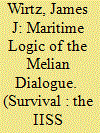

|
|
|
|
|
| Summary/Abstract |
There is a maritime logic embedded in Thucydides’ ‘Melian Dialogue’ that until now has attracted little notice; observers have instead concentrated on the deeper philosophical and moral issues highlighted by Thucydides in his tale drawn from the Peloponnesian War. Nevertheless, the maritime logic that propelled a confrontation on the island nation of Melos nearly 2,500 years ago could re-emerge in the run-up to a conflict in the Western Pacific. Allies are the strategic enabler of the US naval presence in the region, and US forces are taking steps to develop concepts and doctrine to enable operations in and along the First Island Chain. Denying access to these logistical facilities might be a political priority for China in the run-up to potential military action, and it would not be surprising if Beijing delivered a simple message to the inhabitants of the First Island Chain: stay out of it, and we will leave you out of it. All of this suggests that the idea of ‘neutrality’, as encountered in the Melian Dialogue, might again emerge during a crisis. Because the incentives to restrict US access to forward-operating bases are so clear-cut, strategists need to anticipate the emergence of ideas related to limiting the ability of US naval units to use port and air facilities in the Western Pacific.
|
|
|
|
|
|
|
|
|
|
|
|
|
|
|
|
| 3 |
ID:
159269
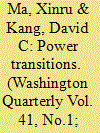

|
|
|
| 4 |
ID:
157784
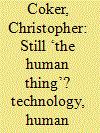

|
|
|
|
|
| Summary/Abstract |
Is war beginning to escape human control? Thucydides tells us the war is one of the things that makes us definitively human; but how long will this continue to be the case as our relationship with technology continues to develop? Kenneth Waltz’s book Man, the State and War affords one way of answering that question. So too does Nikolaas Tinbergen’s framework for understanding human behaviour and Bruno Latour’s Actor–Network Theory (ANT). The main focus of this article is the extent to which we will diminish or enhance our own agency as human beings, especially when we come to share the planet with an intelligence higher than our own.
|
|
|
|
|
|
|
|
|
|
|
|
|
|
|
|
| 5 |
ID:
163406
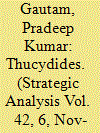

|
|
|
| 6 |
ID:
075063


|
|
|
|
|
| Publication |
2006.
|
| Summary/Abstract |
No ancient scholar made a larger contribution to both the theoretical and practical understanding of grand strategy than did the Athenian historian Thucydides the Alimousian. This paper reconstructs the historical context of his History by analyzing it through the multidisciplinary lenses of strategic theory. It highlights the basic "bones of contention" in the historical debate of the last 150 years concerning the causes of the war; the systemic and bilateral balance of power; the political, economic, military and diplomatic parameters that influenced its outcome; and the efficiency of the major alternative strategies followed by Athens and its main adversaries throughout the duration of the conflict.
|
|
|
|
|
|
|
|
|
|
|
|
|
|
|
|
| 7 |
ID:
113303


|
|
|
|
|
| Publication |
2012.
|
| Summary/Abstract |
Most of our knowledge of the Peloponnesian War comes from the text of Thucydides' History, yet IR scholars are strangely credulous when evaluating Thucydides' pronouncements. I explore what Thucydides does not tell us, and suggest that his text obscures important information regarding the outbreak of the war. Thucydides has a secular bias which leads him to discount the Spartan religious self-narrative, but by attending to this schema, in which Sparta sees itself in the role of the pious defender of moderation pitted against the corrupt Athenians, we gain a richer understanding of the chain of events that led to war. Contemporary scholars have too readily adopted Thucydides' perspective on this issue, but by assessing Thucydides' data using insights drawn from contemporary cognitive theories of narrative and image we see that misperceptions based in the conflicting Athenian and Spartan narratives played an important role in the escalation of the crisis.
|
|
|
|
|
|
|
|
|
|
|
|
|
|
|
|
| 8 |
ID:
077211
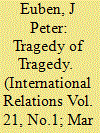

|
|
|
|
|
| Publication |
2007.
|
| Summary/Abstract |
There are good reasons to consider tragedy, especially Greek tragedy, a resource for current debates in international relations. This is not only because of the ethical and political dilemmas tragedy explores with such dramatic force, but because tragedy is a significant context for reading Thucydides with the political and literary acumen he demands. To ignore this context is to domesticate the ways tragedy challenges both our conventional readings of Thucydides as well as our substantive views of politics and the ways we study it. While this article fully supports the enterprise of invigorating classical realism with the study of tragedy and of posing the question, 'What can a tragic sensibility contribute to our understanding of international politics?', it makes that enterprise and that question more rather than less problematic. But it does so in the name of Greek tragedy and for an ultimately more challenging appropriation of it.
|
|
|
|
|
|
|
|
|
|
|
|
|
|
|
|
| 9 |
ID:
049908
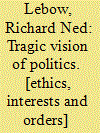

|
|
|
|
|
| Publication |
Cambridge, Cambridge University Press, 2003.
|
| Description |
xvii, 405p.
|
| Standard Number |
9780521534857
|
|
|
|
|
|
|
|
|
|
|
|
Copies: C:1/I:0,R:0,Q:0
Circulation
| Accession# | Call# | Current Location | Status | Policy | Location |
| 047364 | 172.4/LEB 047364 | Main | On Shelf | General | |
|
|
|
|